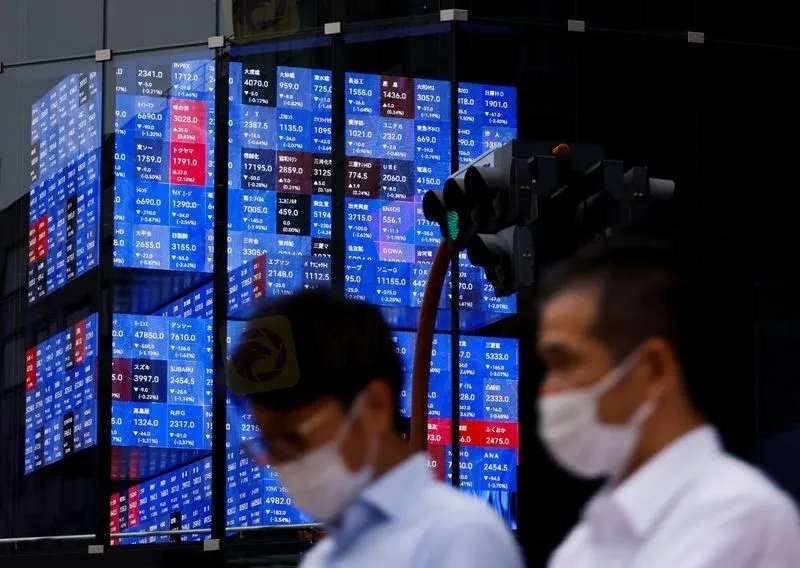简体中文
繁體中文
English
Pусский
日本語
ภาษาไทย
Tiếng Việt
Bahasa Indonesia
Español
हिन्दी
Filippiiniläinen
Français
Deutsch
Português
Türkçe
한국어
العربية
WIKIFX REPORT: Stocks rally, dollar slides on risk-on sentiment
Abstract:Equity markets rose and the dollar slid on Monday on heightened risk-on sentiment driven by hopes the U.S. economy is slowing enough to allow the Federal Reserve to ease its rate-hiking pace and the ongoing speculation that China may ease COVID restrictions.

Equity markets rose and the dollar slid on Monday on heightened risk-on sentiment driven by hopes the U.S. economy is slowing enough to allow the Federal Reserve to ease its rate-hiking pace and the ongoing speculation that China may ease COVID restrictions.
Markets looked past data showing Chinese exports and imports unexpectedly contracted in October as China grapples with COVID-19 curbs, and indications a report on the U.S. consumer price index on Thursday will show stubbornly high inflation.
U.S. stock indexes edged higher in choppy trading with the focus on Tuesdays mid-term elections that will determine whether the Republicans are strong enough to take over Congress and underlines the difficult prospects for Democrats.
While a divided Congress is typically viewed as good for markets, the hope the U.S. economy is losing enough momentum for the Fed to slow the pace of monetary tightening is pushing the dollar lower, said Joe Manimbo, senior market analyst at Convera in Washington.
“The market is really desperate for the Fed to pivot,” Manimbo said. “It will take anything it can get in terms of signs of a softening economy to hold out hope that a pivot might materialize sooner rather than later,” he said.
Slower inflation on the heels of signs in Fridays U.S. employment report that the labor market is cooling, would be positive for risk appetite and negative, at least over the short term, for the dollar, Manimbo said.
The euro rose 0.34% to $0.9994 and the Japanese yen weakened 0.04% against the dollar at 146.68.
Major indices in Europe mostly edged higher, with the exception of the FTSE 100 in London, while Wall Street was mostly higher as the Nasdaq bounced around break-even.
MSCIs all-country world index gained 0.53%, and the broad pan-European STOXX 600 index rose 0.32%.
On Wall Street, the Dow Jones Industrial Average rose 0.51%, the S&P 500 gained 0.10% and the Nasdaq Composite dropped 0.17%.
The dollar also was under pressure as traders held on to the idea that China could temper some of its COVID restrictions after the government on Monday indicated it will make it easier for people to enter and exit the capital.
Stephane Ekolo, strategist at Tradition in London, said the market is looking for an excuse to buy stocks.
“In spite of China sticking to its zero-COVID pledge, there are some in the market that still believe that China might somewhat ease its COVID-19 policy,” Ekolo said.
A strong U.S. jobs report for October last week ensured the Fed will be in no rush to pivot away from its aggressive tightening of monetary policy, a view that kept Treasury yields higher.
The yield on two-year notes, which typically moves in step with rate expectations, rose 7.8 basis points at 4.730%, while the 10-year yield was up 6 basis points to 4.218%.
Fed Chair Jerome Powell last week quashed speculation that the U.S. central bank could slow the pace of its monetary tightening, saying rates would likely stay higher, for longer.
Median forecasts call for annual inflation to slow to 8.0% and for the core to dip a tick to 6.5%.
Oil prices rose to more than a two-month high on news that China, the worlds top crude importer, could take steps toward reopening after years of strict COVID restrictions, The Wall Street Journal reported, citing sources.
U.S. crude rose 0.5% to $93.07 per barrel and Brent was at $98.92, up 0.36% on the day.
Disclaimer:
The views in this article only represent the author's personal views, and do not constitute investment advice on this platform. This platform does not guarantee the accuracy, completeness and timeliness of the information in the article, and will not be liable for any loss caused by the use of or reliance on the information in the article.
Read more

Justice Served: Illegal Investment Scheme Ends in RM28 Million Repayment
The Kuala Lumpur High Court has ruled that a Singaporean businessman, Chan Cheh Shin, must return RM28 million to 122 Malaysian investors after the court determined that his investment operations were conducted illegally.

RM900,000 Scammed: The Hidden Dangers of Online Investment Schemes
A 53-year-old factory manager from Malaysia has fallen victim to an online investment scam, losing over RM900,000 of her savings. This case underscores the growing threat of online scams preying on unsuspecting individuals.

Doo Group Expands Its Operations with CySEC License
Doo Financial, part of Doo Group, receives a CySEC license, allowing FX/CFD services in Europe. This strengthens its global presence and regulatory standards.

Exness: Revolutionizing Trading with Cutting-Edge Platforms
Exness offers traders seamless experiences with its Exness Terminal and Exness Trade app, providing flexibility, advanced tools, and low-cost trading.
WikiFX Broker
Latest News
BSP Shuts Down Uno Forex Over Serious AML Violations
ACY Securities Expands Global Footprint with South Africa Acquisition
Tokyo Police Arrest 4 for Unregistered FX Trading Scheme
Rupee gains against Euro
Axi Bids AUD 52M to Acquire Low-Cost Broker SelfWealth, Outbidding Competitor Bell Financial
Crypto Influencer's Body Found Months After Kidnapping
US Regulators Tighten Oversight on Bank Anti-Money Laundering Efforts
Doo Group Expands Its Operations with CySEC License
RM900,000 Scammed: The Hidden Dangers of Online Investment Schemes
5 Advantages of Choosing a Regulated Broker
Currency Calculator


